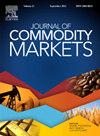Decomposed and partial connectedness between oil shocks and sovereign credit risk in emerging economies: Insights from the Russia-Ukraine war
IF 4.5
4区 经济学
Q1 BUSINESS, FINANCE
引用次数: 0
Abstract
This paper explores the decomposed and partial connectedness between oil shocks and sovereign credit risk, emphasizing the dynamics in emerging economies divided between oil-importing and exporting nations. Using data from June 28, 2013, to June 1, 2023, empirical findings indicate that oil demand and supply shocks have become net receivers during the Russo-Ukrainian war, absorbing spillovers from sovereign credit risks. Risk shocks emerge as the only consistent and intensifying net transmitters, indicating the growing role of geopolitical uncertainty in driving volatility. Mexico appears as a notable net transmitter. Brazil also plays a persistent role as a systemic transmitter, while Russia's diminishing influence and higher self-insulation reflect financial decoupling under sanctions. A decreased total connectedness during the conflict suggests a decoupling trend among countries. Our analysis demonstrates the predominance of external over internal connectedness, emphasizing the significant influence of global events. The results display distinct connectedness patterns between oil-importing and exporting countries, reflecting the varied effects of oil price volatility on sovereign credit risk, particularly during geopolitical instability.
新兴经济体中石油冲击与主权信用风险之间的分解和部分联系:来自俄乌战争的洞察
本文探讨了石油冲击与主权信用风险之间的分解和部分联系,强调了石油进口国和出口国之间划分的新兴经济体的动态。利用2013年6月28日至2023年6月1日的数据,实证结果表明,在俄乌战争期间,石油需求和供应冲击已成为净接受者,吸收了主权信用风险的溢出效应。风险冲击是唯一持续且不断加剧的净传导因素,表明地缘政治不确定性在推动波动方面的作用日益增强。墨西哥是一个值得注意的净发射机。巴西也一直扮演着系统性传递者的角色,而俄罗斯影响力的减弱和更高的自我隔离反映了制裁下的金融脱钩。冲突期间总连通性的下降表明了国家间的脱钩趋势。我们的分析表明外部连通性优于内部连通性,强调了全球事件的重大影响。结果显示石油进口国和出口国之间存在明显的联系模式,反映了油价波动对主权信用风险的不同影响,特别是在地缘政治不稳定的情况下。
本文章由计算机程序翻译,如有差异,请以英文原文为准。
求助全文
约1分钟内获得全文
求助全文
来源期刊

Journal of Commodity Markets
Multiple-
CiteScore
5.70
自引率
2.40%
发文量
53
期刊介绍:
The purpose of the journal is also to stimulate international dialog among academics, industry participants, traders, investors, and policymakers with mutual interests in commodity markets. The mandate for the journal is to present ongoing work within commodity economics and finance. Topics can be related to financialization of commodity markets; pricing, hedging, and risk analysis of commodity derivatives; risk premia in commodity markets; real option analysis for commodity project investment and production; portfolio allocation including commodities; forecasting in commodity markets; corporate finance for commodity-exposed corporations; econometric/statistical analysis of commodity markets; organization of commodity markets; regulation of commodity markets; local and global commodity trading; and commodity supply chains. Commodity markets in this context are energy markets (including renewables), metal markets, mineral markets, agricultural markets, livestock and fish markets, markets for weather derivatives, emission markets, shipping markets, water, and related markets. This interdisciplinary and trans-disciplinary journal will cover all commodity markets and is thus relevant for a broad audience. Commodity markets are not only of academic interest but also highly relevant for many practitioners, including asset managers, industrial managers, investment bankers, risk managers, and also policymakers in governments, central banks, and supranational institutions.
 求助内容:
求助内容: 应助结果提醒方式:
应助结果提醒方式:


